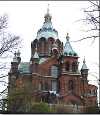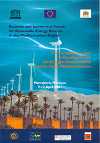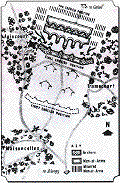

|
|
|
|
|
Germany (Berlin) |
 |
State parliament and municipal district assembly elections. Results : The Social Democratic Party wins 29.7% of the vote (44 of 141 seats), the Christian Democratic Union 23.7% (35), the Party of Democratic Socialism 22.6% (33), the Free Democratic Party 9.9% (15), and the Greens 9.1% (14). Turnout is 68.2%. |
|
Spain (Galicia) |
 |
Parliamentary elections. Results : The People's Party wins 50.9% of the vote (41 of 75 seats), the Galician Nationalist Bloc 23.3% (17), and the Socialist Party of Galicia 21.8% (17). Turnout is 64.2%. The veteran Spanish politician, 78-year-old Manuel Fraga, celebrated his re-election as regional premier of Galicia. |
|
Parlaclen |

|
Salvadorean José Rodrigo Samayoa Rivas has been elected as the new president of the Central American Parliament (Parlaclen), and will take up his one-year term at the end of the month. The Centro American Parliament is the most important organism for polítical and regional integration in Latin América ; along with the European Parliament they both constitute unprecendented integrationist institutions in the world,established with members of parliament popularly and democrátically elected. The Centro-American Parliament is a young organism,which is completing a hard task of its establishment and accomodation, being a new experience in our isthmus. The Constitutive Treaty of the Centro American Parliament in Chapter I artícle1, sets the nature of the Centro-American Parliament as follows: "An órgan for planning, análysis and advice on polítical economic, social and cultural issues, of joint interest, in order live together peacefully in a security and social welfare background which would originate in a representative and participating democracy, with pluralism and respecting national legislations and international Law. |
|
Australia |
 |
Rob Kerin becomes premier of South Australia following the resignation of John Olsen. Kerin profile : Born on 4 January 1954. Educated at Crystal Brook Convent, Sacred Heart College and University of Adelaide In 1993 was elected to Parliament to represent the electorate of Frome. The electorate of Frome is a largely rural area in the North of South Australia based on the important regional centre of Port Pirie and also includes the Clare Valley. Appointed Minister for Primary Industries in December 1995, and in December 1996 was given the additional Portfolio responsibility of being appointed the Minister assisting for Regional Development and Small Business. Following the State Election in October 1997 was appointed as Minister for Primary Industries, Natural Resources and Regional Development. Appointed Deputy Premier on 7 July 1998. On 14 February 2000, a restructure of portfolios resulted in his appointment as Deputy Premier, Minister for Primary Industries and Resources and Minister for Regional Development. |
|
Jamaica |
 |
Prime Minister P.J. Patterson replaced his national security minister, shuffling his Cabinet after months of gang violence that has shaken Jamaica's capital. Patterson made several other cabinet changes as well, including naming Knight, who has lead Jamaica's ministry of national security and justice for the past 12 years, as foreign affairs minister. The current head of that office, Anthony Hylton, will head the energy ministry. |
|
Dominican Republic |
 |
President Hipolito Mejia has replaced his minister of interior in a Cabinet reshuffle, the first high-level change in his administration. Mejia named his administrative secretary, Pedro Franco Badia, to replace Minister of Interior and Police Rafael Suverbi Bonilla, who was shifted to head the ministry of tourism. |
|
Vatican |
 |
The Vatican ratified two amendments to a treaty that would stop the use of child soldiers and protect children from sexual abuse, and it promised to lobby other governments to do the same. The amendments, called optional protocols to a 1990 landmark treaty on the rights of children, prohibit the use of child soldiers and outlaw child prostitution, sexual slavery, child pornography and forced labor. The Vatican, which has observer nation status at the United Nations, is the seventh state to ratify the protocol on child soldiers, which needs 10 ratifications to enter into force. It is the 11th state to ratify the protocol on child abuse, which now has enough ratifications to go into force shortly. The Convention on the Rights of the Child is the most widely approved treaty in the U.N. history, with ratifications from 191 countries. The United States and Somalia are the only two countries that have not ratified the treaty. |
|
Finland |


The Uspensky cathedral in Helsinki |
The General Assembly of the Orthodox Church of Finland has elected Metropolitan Leo, 53, of Helsinki to become Archbishop of Karelia and all Finland. The other candidate for the office was Metropolitan Ambrosius, 56, of Oulu. The vote in the General Assembly was 23 to 13. The election, at the Valamo monastery in Heinävesi, must still be formally confirmed by Ecumenical Patriarch Bartholomeos of Constantinople. Leo will replace the retiring Archbishop John, 78. History of Orthodox Church of Finland : The roots of the Finnish Orthodox Church lie in the missionary work done at the beginning of the second millenium in the easternmost area settled by Finnish tribes, that is, the province of Karelia. This primarily originated from the monasteries, and was carried out by Orthodox monks. The monastery at Valamo, founded according to tradition by the Greekborn monk Sergius and his younger assistant Herman, was the most important base. As time went by, several other monasteries were found to back up the Church's work. The Orthodox parts of Karelia did not form part of Sweden-Finland politically until the latter half of the 16th century, and even more extensively in the 17th century. In 1809 - 1917, when Finland was a Grand Duchy of the Russian Empire, a separate diocese was established for the Orthodox parishes (1892), centred on Vyborg (Karelia). When Finland became independent in 1917, the Church's administrative links with the Russian Church were broken. Aftervarious intermediate stages, the Orthodox Church's standing in Finland was formalized through government action: in 1923 it canonically became an autonomous Orthodox church under the Ecumenical Patriarch of Constantinople, gaining extensive selfgovernment in internal matters. As early as 1918 the Finnish Government had endorsed, through a special decree, its status as the second national church, the other being Evangelical Lutheran. The Current Act on the Orthodox Church of Finland dates from 1969, with a supplementary Decree the following year and with several amendments and changes made in recent years. |
|
Singapore |
 |
Singapore's governing People's Action Party (Pap) has won another five-year term in office by default, after the opposition failed to nominate enough candidates. The opposition Singapore Democratic Alliance put forward candidates in less than half of the 84 seats being contested in the 3 November election. The Prime Minister, Goh Chok Tong, said his party was back in power after winning at least 45 seats before a single vote was cast. He said Pap was already working to form a new government. The Pap has governed Singapore since independence, and won all but two of the 87 seats contested in the last election. The opposition has never held more than four seats. |
|
Morocco |
 |
Morocco (Agadir) hosts Mediterranean Forum - Extraordinary meeting of ministers. Foreign ministers of the 11 European Union-Mediterranean partners to consider the social and economic consequences in the region of the terror attacks on the United States on Sep 11 and its retaliation against Afghanistan. The ministers will we looking for a way to reinforce security in the region. They are expected to release a joint statement condemning the attacks. The US attacks on Afghanistan may also come in for condemnation. The Euro-Mediterranean partners are: Morocco, Portugal, Spain, France, Italy, Greece, Malta, Turkey, Algeria, Tunisia and Egypt. |
|
Greece |
 |
Greek Prime Minister Costas Simitis reshuffled his cabinet. The new Cabinet, which numbers 43 ministers and deputy ministers and includes 15 members who have not previously held ministerial posts and five women. |
|
Ukraine |
 |
Ukrainian Defense Minister Oleksander Kuzmuk resigned, almost three weeks after his troops accidentally shot down a Russian airliner with a missile. President Leonid Kuchma said in an address on state television that he had accepted the resignation and had suspended other senior military officials. Profile : Kuzmuk Oleksandr Ivanovich was born on April 17, 1954 in the village Dyatlivka, Slavutich area, Khmelnitsk region. Occupies the post of the General of Ukraine. In 1975 graduated from Kharkov Tank Command College, in 1983 he graduated from Military Academy of armoured forces. Oleksandr Kuzmuk started from Commander of tank platoon and went all the way to the Commander of Army Corps. From October 1995 - Commander of the National Guards of Ukraine. From July 1996 - Minister of Defence of Ukraine. Appointed Minister of Defence of Ukraine in the Presidents' Decree from December 30, 1999. |
|
Lesotho |
 |
In the 5th cabinet reshuffle since the ruling Lesotho Congress for Democracy (LCD) took to the driving seat following the 1998 elections, the first ever blind person has been appointed to lead a ministry. Member of the Upper House of Parliament, Senator Advocate Refiloe Masemene is heading forward to lead the Law, Justice and Constitutional Affairs ministry. Advocate Masemene was lost of sight at the age of 11. But this condition did not derail his educational advancement as he proceeded to pursue his career in law. He specialized land-tenure isuues. Asked if he would not be incapacitated by his condition, particularly in the signing of documents, Masemene said he believed in capacity and confidence. He said he would perform his ministerial duties very well without any impairment constraints. Advocate Masemene was led by his wife Matseliso Masemene who acted more like a bodyguard for her husband. |
|
Mauritania |
 |
Parliamentary and local elections - 2nd round, if required. Results : Mauritania's ruling party sealed its hold on the country's parliament, winning most of the remaining seats in a runoff election. President Maaouya Sid'Ahmed Ould Taya's ruling Republican Democratic Party won 10 of the 13 seats that were left undecided after a first round of voting Oct. 19, the Interior Ministry announced. A government-allied party won one seat in runoff election, while the opposition took the last two seats. The gains give the ruling party 64 of the 81 seats in the National Assembly. Government-allied parties control six seats while the opposition has 11 seats. |
|
South Africa |
 |
The trade and industry department has appointed the deputy vice-chancellor of the University of Cape Town (UCT), Dr Sibusiso Sibisi, as the new president of the council for Scientific and Industrial Research Council (CSIR). Profile : Dr Sibisi matriculated from Marianhill High School in Pinetown, KwaZulu/Natal, in 1973. Among other qualifications, he holds a BSc (Hons) in Physics from Imperial College of Science and Technology in London and a PhD from the Department of Applied Mathematics and Theoretical Physics (DAMTP) at Cambridge University. Dr Sibisi co-founded a scientific consulting start-up company at Cambridge before returning to South Africa in 1997. Career appointments held by Dr Sibisi include the position of Managing Director of Plessey Technology, South Africa ; membership of the Board of Denel; membership of the International Governing Board of UNESCO's Institute for Information Technology in Education, and he is chairperson of the National Advisory Council on Innovation. Dr Sibisi is also the founder of ASSIST (Advanced Software Solutions in Science and Technology). Dr Sibusiso Sibisi (44) took up his appointment as Deputy Vice-Chancellor on 4 January, 2000. Dr Sibisi is married to Keneiloe and has a daughter. |
|
Bangladesh |
 |
First session of the newly-elected parliament. BNP leaders Jamiruddin Sircar and Mohammad Akhtar Hamid Siddiky were chosen as speaker and deputy speaker respectively. |
|
Canada (Saskatchewan) |
 |
The Saskatchewan Liberal Party has a new leader. David Karwacki, a 36 year old businessperson who has never run for elected office before, defeated North Battleford MLA Jack Hillson by a vote of 430 to 228 at the party's convention. Karwacki and Hillson had both pledged to get the Liberal Party out of its coalition with the governing New Democratic Party. However, the two MLAs still in the coalition government, former leader Jim Melenchuk and MLA Ron Osika, have indicated that they may want to remain in the government. Profile : David Karwacki grew up in Saskatoon, and has been a lifelong resident of Saskatchewan. Educated in Saskatoon, David attended the University of Saskatchewan, graduating from the College of Commerce in 1989. He is engaged in continuing education through his enrolment in the Birthing of Giants programme at M.I.T. in Boston. While pursuing his academic interests, David was a member of the University of Saskatchewan Huskie Basketball Team from 1984 - 1989, and known as a member of the "fab five." The team represented Saskatchewan at the national level, competing in the national championships. In 1990, David Karwacki and three business partners founded Star Produce, Ltd., an international fresh produce distribution company. David has served as Chief Operating Officer of the company, and is currently CEO. David Karwacki has been an active member of the Saskatchewan community, serving as the President of the Huskie Basketball Alumni Association ; acting as the founding board member of the University of Saskatchewan Athletic Endowment Fund; and participating as an active member of the St. Anne's faith community. David has maintained a lifelong interest in the Liberal Party and in Saskatchewan politics; he has worked in many capacities in both provincial and federal elections in support of the democratic process. David is married to Laurie Karwacki, an educator; they have chosen to live in Saskatchewan, and raise their family of four children: Jonathan, Alix, Sarah and Luke. |
VIPS-INFO
|
|
VIPS-Gov. |
THIS WEEK'S STORY

25 October 1415
|
The Hundred Years War was fought because of claims by English monarchs on the French throne. In 1415, Henry V sailed to France for a season of campaigning. After a successful but long siege of Harfleur, he decided to march through the French countryside to Calais before returning to England. In spite of the political turmoil in France, various nobles marshalled their forces to block Henry's march north. On 25 October 1415, the French forces blocked the road to Calais and challenged Henry to battle. The lines were drawn in some recently plowed fields between the villages of Azincourt and Tramecourt. English forces, weary and ill from the long march, were outnumbered by the French forces and appeared to be doomed. At first, the French waited; Henry ordered the English line to move forward to extreme longbow range and stop. The first round of arrows to strike the French ignited a cavalry charge and the battle was joined. The cavalry charge was blunted by concentrated English longbow firing, the muddy field, and wooden stakes the English archers had driven into the ground. The French nobles, knights, and men-at-arms advanced on foot towards the English infantry. By the time they reached the English line, most were exhausted by the struggle through the mud. The French ignored the English archers (who were firing constantly) so as to gain glory by defeating the English nobles. Those French men felled by arrows or pushed to the ground were helpless because their heavy armor kept them from standing. The English line held while the lightly-armored (thus nimble) archers killed prostrate French. The battle turned into a rout and the French departed the field. While sources vary, it appears that the English lost a few hundred men while the French lost several thousand. The English longbowmen certainly played a major role but the primary reason the French were defeated was their lack of a unified command. The French were provoked into an attack on unfavorable terms and no commander on the field had the ability to stop the charge. The English won the day; the French eventually won the war and expelled the English from France. |
|

